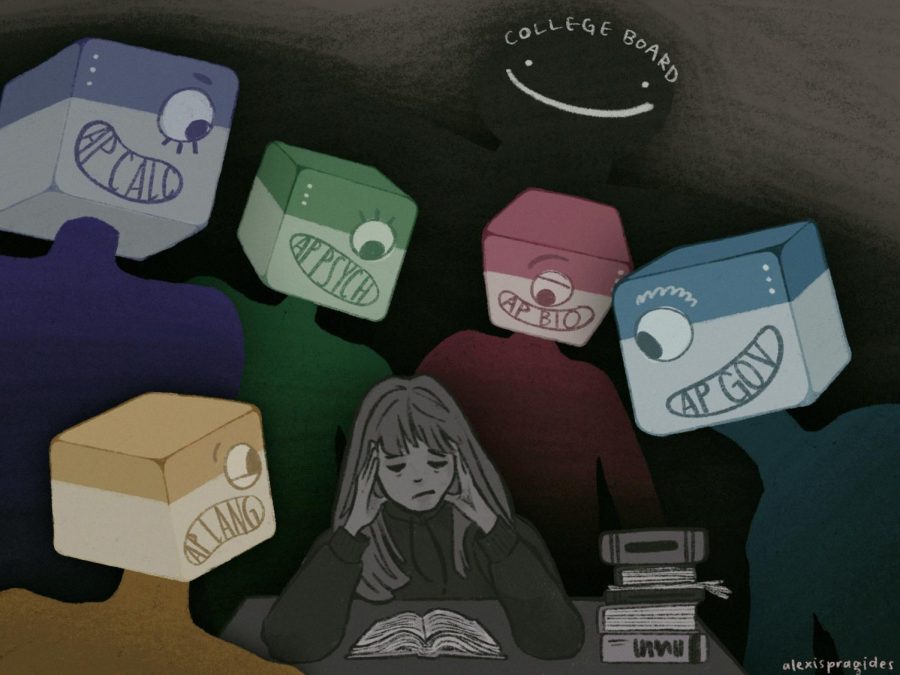How College Board will disappoint students with AP testing… again
College Board expects students currently under remote learning to learn at the same pace as students in in-person.
Last May, College Board administered over four million at-home AP exams, disappointing thousands of students with server crashes and thousands more with inconsistent difficulty levels across test forms. The 2020 AP testing season was a period of heartbreak and anger for many students. Most of us now are simply content with it being over, but I wouldn’t get too comfortable, because College Board is about to let us down again.
Schools all over the country have now responded in different ways to the ongoing pandemic. Some schools, such as DGS, have decided to shut down all in-person operations in favor of a fully remote schedule. However, schools in many other states like Texas, Florida and Iowa already have students back in the classroom.
It seems that for this reason, College Board has maintained their November registration deadline and decided that all material that would normally be taught throughout an AP course is fair game on the upcoming exams in the spring.
Wonderful.
Normally, this wouldn’t be an issue. It makes perfect sense that College Board would want to include all the material of the course into their exam, but to do it in a school year in which half of the country’s students are still required to follow a remote learning schedule is thoroughly tone deaf. And regardless of all of this, College Board has yet to specify whether exams will be in-person or online.
From the most obvious standpoint, many students under remote learning schedules must cope with unstable internet and connectivity issues which hinder their ability to immerse themselves into the class; even at its best, remote learning cannot match in-person learning. But what we must also consider is that students now severely lack variety in their surroundings. That is, many students are now being cooped up in a single room in their house for the full length of the school day, and then some in order to complete homework.
How realistic is it to expect students who have been trapped in their own bedrooms for upwards of eight hours a day, five days a week to learn to the best of their ability? All the while, teachers are having issues of their own with organization, technology and test administration. College Board is setting a nearly unworkable standard for students and teachers alike.
We might pause here and take a moment to consider that maybe attention issues are the fault of the student. Let’s say that this is a fair argument—at what point do we consider how much teachers are cutting from their normal coursework in order to keep up with all the material that College Board expects them to teach while also making accommodations for fully remote scheduling?
Many AP teachers are feeling the pressures of the coursework just as much as the students are. In several of my classes I’ve heard teachers talk about how College Board is severely lacking communications with teachers all the while pushing the full load of material into their hands.
To place the cherry ever so delicately on top, though, College Board has put another burden onto students’ heavy shoulders.
As they would during a normal school year (one not affected by a deadly virus), College Board is maintaining their November deadline for AP exam registration. Not only are students under remote learning having to do what feels like speed-running AP courses, but they also now have to make a decision of whether or not they’d like to spend nearly $100 per exam to sit for several hours on tests that take place eight months from now.
Despite all the uncertainty though, College Board will be waiving cancellation and unused exam fees if a student decides that they no longer want to take an exam. While this is a slight comfort in the face of a monster, it’s still unwaveringly unfair to ask that students make their decisions to take the exam so early on when many students don’t even know if they’ll be returning to in-person school at all. Not to mention students that are immunocompromised who may not be able to return even if there were plans to go back.
Currently, College Board is viewing the situation we have at hand with astounding myopia. Both students and teachers alike deserve a higher level of both communication and empathy given the widespread set of circumstances across the nation.


